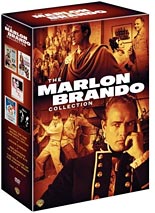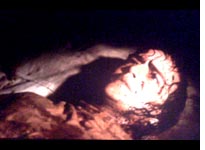Replaying Brando
How DVD adds new depth to his greatness.

Marlon Brando's peers, imitators, and most extreme fans mistake him when they claim that he was the greatest film actor we have ever seen. Misled, they push this perspective primarily because of Brando's mumbling, posing, raging, and pouting—influential moves that were copied because they constituted a style perfect for expressing men with adolescent limitations. Yet Brando used these techniques only for certain characters and found other ways to lift his roles into life. While it's understandable that Brando would be celebrated for his visceral portrayal of adolescent limitations at a time, after World War II, when that archetype began to overtake American society, that wasn't Brando's principal talent. The aesthetic fact of the matter is that Brando's main achievement was to portray the taciturn but stoic gloom of those pulverized by circumstances. He was one of our finest cinematic poets of defeat.
As William Carlos Williams pointed out, our culture tends to confuse a tragic figure with a loser. This means that the admission and rueful acceptance of having been beaten by life form the grand personal tragedy in the American context. With so few examples of how well this sensibility can be articulated, the American actor of sensitive instincts soon realizes that the expression of defeat or of tragedy is one of the hardest things to do and still remain beyond sentimental overstatement. But Brando was capable of making extreme sentimentality part of a character's temperament, and the actor's facility in the dangerous world of emotional pathos granted him some of the supreme moments in American cinema.
We can now understand On the Waterfront (1954) as a foreshadowing of the deepest meanings of the nonviolent tactics of the civil rights movement. Brando is most heartbreaking in the scenes with Eva Marie Saint, when he expresses through Terry Malloy a feeling of impotence and complicity in murderous corruption. Brando, so aware of how much Malloy wants the girl to respect him, brings a masterfully subtle and meek tone of apology to the voice, face, and gestures of a young man who can no longer try to be tough and unconcerned in the face of debasing mob rule.
In those scenes, Brando individuated the universal common man under the thumb of ruthless power, a type of individual whom we saw rise to bring change in the colonial, the capitalist, and even the totalitarian worlds given so much debilitating day-to-day detail by writers like Milan Kundera. Almost any good actor could have portrayed Terry Malloy in his rageful and anarchic moments, which we have seen many times, in everything from Westerns to crime stories. The excruciating shame that Terry feels for having hidden his abundant fear behind a bluffing mask of false worldliness could have been given such stinging three-dimensionality by only a few, and Marlon Brando was one of them.
Don't believe the hype: Brando's Terry Malloy did not come out of nowhere. His was an extension of the American blues within the context embodied by Gary Cooper in Meet John Doe (1941), Henry Fonda in The Grapes of Wrath (1940), and Jimmy Stewart in Mr. Smith Goes to Washington (1939), all of whom had a heroic gripe with some aspect of the system. What Brando actually did was bring the new urban harmonies necessary to whisper and belt out the blues created by the gangster forces in the shadow world of the city. Almost no such moments are contained in The Marlon Brando Collection of DVDs. It is an unrepresentative collection of the actor at the height of his intimately provocative talents, but it does contain two masterpieces of performance so different from one another that the breadth and certitude of Brando's range is bracing.

One is Brando's Fletcher Christian in Mutiny on the Bounty (1962), a character he interprets as a high-toned British fop who is more than mildly reluctant to face the sadistic inclinations of Trevor Howard's finely drawn Capt. Bligh—a leader who mistakes sadism as a substitute for firm but inspirational command. Brando has a superb understanding of how much it takes for a witty, charming, and insubstantial man to stand up against the very order that guarantees his position in the world. But his finest moment is the point at which Christian asks if he is going to die. The question quakes with a soft but desperate tone devoid of privilege or mannered cultivation. When told his wounds are fatal, the leader of the mutiny responds with a timeless look of doomed recognition that stands with the best.
The other masterpiece is Brando's tragically repressed homosexual in Reflections in a Golden Eye (1967), which has scalding moments of self-realization that might equal in visual eloquence the darker mirrors into which Shakespeare's characters peer. That might sound like a mediocre instance of contemporary toadying to a legendary star, but let me explain. In the theater, an actor's voice and body communicate to the audience most fully because many of those in the seats cannot make out facial expression to any great extent. Film made the face, rather than the voice, the actor's ultimate solo instrument and the close-up into a cinematic cadenza through which unprecedented facial expression was possible. When a master of Brando's talent is at work, a picture that is equal to the words of Shakespeare becomes a moving phenomenon, and prodigious levels of revelation are available to the eye.
The replays made possible through DVD now give film performances a quality akin to the book in which one can read a passage over and over for enjoyment, for understanding, or for the discovery of how technique functions. So, today's viewer experiences a film far differently than audiences did in the past. As we all know, one can not only buy and take home a film, one can leap forward or backward to a favorite or a puzzling scene, and even change the visual velocity, revealing much that the eye can't see at the original speed. A given scene can be played back like a favorite aria or a jazz improvisation in recorded performance. While the reductive aspect of this technology makes many special effects far less special, it also clarifies that an actor of Brando's caliber is the most remarkable special effect that film can provide.
Reflections in a Golden Eye (1967), like any superior film, benefits greatly from the DVD format and the revisions it makes possible. The inclusion of the experimental gold and sepia tone, which was removed from the print shortly after the film was released, allows the audience of our moment to see a film that most did not when it was available in theaters. We now have director John Huston's vision intact. We also have Brando in one of the boldest performances ever given by an actor on screen. What validates that last claim is the exemplary courage of Brando's egoless deep sea dive into his character, Maj. Penderton, whose desperate and arrogantly veiled pathos tellingly overflows twice. The character's central problem is his feeling of inadequacy, of being less that he should, and his terrible loneliness because of the difficulty of handling his attraction to men.
Brando reaches a nearly matchless desolation in the first instance of overflowing when his attempt to secretly equal his wife's control of her stallion is thwarted by the horse's power, which he cannot meet with the necessary combination of confident ease and equally confident force. When the stallion smells his fear, it is spooked into running through blueberry bushes that tear the animal's flesh and cut the face of the rider. The humiliation felt by a man facing the terrible pain of his limitations is far more intimate than cutting embarrassment—Brando evokes a moment of horrifying pathos. One thinks of Olivier's well-remembered theater cry after Oedipus has plucked his eyes out, for which the actor used the image of a seal shrieking when its tongue is stuck to the ice until it's clubbed to death by hunters. In the case of Brando's Maj. Penderton, the feeling is banked neither by having a tantrum nor by brutalizing the stallion with a tree branch; the violent action only deepens his sorrow to such a degree that the failed horseman slowly descends into apologetic sobs that cannot be held down. If a more shattering moment is available on film, I would like to know what it is.
The performance is not at all perfect, but its successes are so enormous that mistakes of tone and imposed intent become insignificant. Small are the number of actors who have been able to so perfectly express a man on the verge of collapsing under the weight of his anguish the way Brando does when Maj. Penderton tries to explain a formidable leader's qualities—all of which the major feels that he lacks himself—to a military class of young men who sense that something is wrong, but don't know what. Brando also does something else that proves his unavoidable position among the very finest performers. Without benefit of makeup and through some almost magical understanding of his facial muscles, he is able to nearly remove all handsomeness from himself and take on the look of a pretentious martinet, so much so that Pauline Kael described his officer as "ugly" when putting on skin-tightening cream and looking for a self who is not there in the mirror the way he would like it to be.
Jazz bassist Ray Brown once said, "They'll call a dog a genius today for bringing back a stick, but that doesn't mean the real thing doesn't exist." The ability that Marlon Brando had to tell us what a character felt, thought, and sensed through his body language, his facial expressions, his vocal nuances, and his gestures pinned the badge of genius through his skin. The actor's tragedy was that he lost faith in his talent, which sometimes seemed so, so far beyond talent, and wallowed in despair and bitter eccentricity for most of his life. Our luck is that this magnificent virtuoso of the endless manifestations of human feeling arrived when, through modern technology, he could be captured acting on a level so profound at its best that we will never be able to exhaust all that he gave.